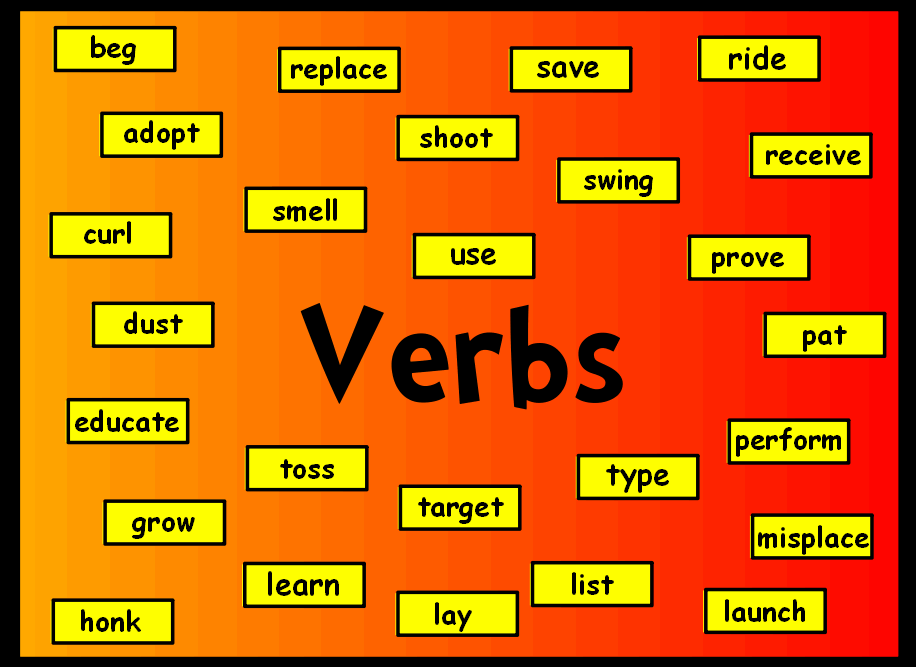
Verbs
A verb describes what a person or thing does or what happens. Verbs are words that express action or state of being. There are three types of verbs: action verbs, linking verbs, and helping verbs. Action Verbs Action verbs are words that express action (give, eat, walk, etc.) or possession (have, own, etc.). Action verbs can be either transitive or intransitive.
For example, verbs describe:
an action – run, hit, travel
an event – rain, occur
a situation – be, seem, have
a change – become, grow, develop
The basic form of a verb is known as the infinitive. It’s often preceded by the word ‘to’:
Molly decided to follow him.
He began to run back.
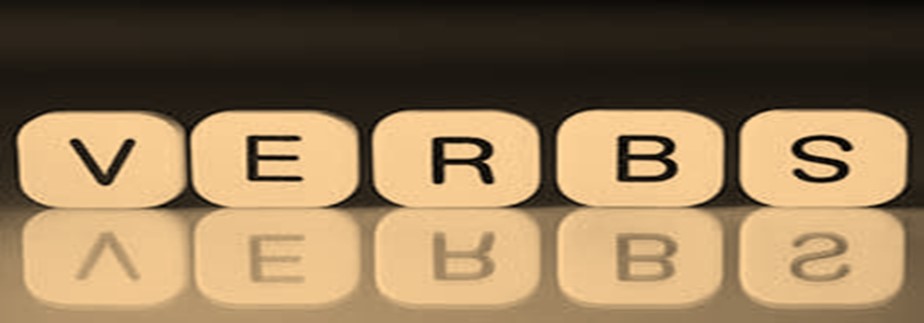
a word that characteristically is the grammatical center of a predicate and expresses an act, occurrence, or mode of being, that in various languages is inflected for agreement with the subject, for tense, for voice, for mood, or for aspect, and that typically has rather full descriptive meaning and characterizing quality but is sometimes nearly devoid of these especially when used as an auxiliary or linking verb.
Main Verbs
Main verbs have meanings related to actions, events and states. Most verbs in English are main verbs:
We went home straight after the show.
It snowed a lot that winter.
Several different types of volcano exist.
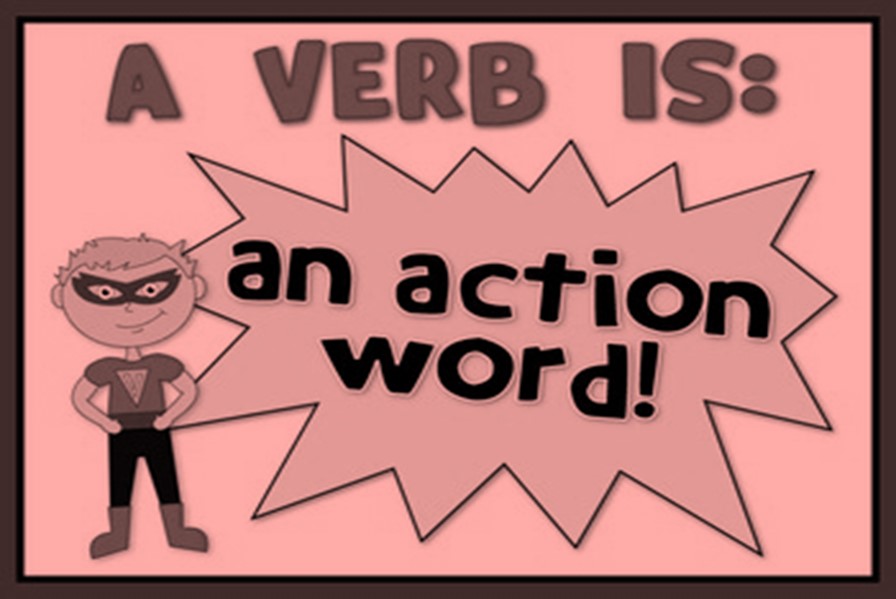
Linking verbs
Some main verbs are called linking verbs. These verbs are not followed by objects. Instead, they are followed by phrases which give extra information about the subject. A linking verb connects the subject of a sentence to a noun or adjective that renames or describes the subject. This noun or adjective is called the subject complement. EXAMPLE: Jason became a business major. The verb, became, links the subject, Jason, to its complement, a business major. The most common linking verb is the verb to be in all of its forms i.e; am, are, is, was, were, etc. This verb may also be used as a helping verb. To become and to seem are always linking verbs.
Linking verbs include:
|
Appear |
Feel |
Look |
seem |
Sound |
|
Be |
Get |
Remain |
smell |
Taste |
A face appeared at the window.
He’s a cousin of mine.
This coat feels good.
She remained outside while her sister went to the hospital.
Transitive Verbs: A transitive verb always has a noun that receives the action of the verb, called the direct object. EXAMPLE: Larissa raises her hand. The verb is raised. Her hand is the object receiving the verb’s action. Therefore, raises is a transitive verb.
Intransitive Verbs: An intransitive verb never has a direct or indirect object. Although an intransitive verb may be followed by an adverb or adverbial phrase, there is no object to receive its action. EXAMPLE: Larissa rises slowly from her seat. The verb is rising.
Helping Verbs: Helping verbs are used before action or linking verbs to convey additional information regarding aspects of possibility (can, could, etc.) or time (was, did, has, etc)
Adverbs
Adverbs are one of the four major word classes, along with nouns, verbs and adjectives. Adverbs are used to add more information about a verb, an adjective, another adverb, a clause or a whole sentence and, less commonly, about a noun phrase.
Adverbs have many different meanings and functions. They are especially important for indicating the time, manner, place, degree and frequency of something. An adverb is a word that is used to change or qualify the meaning of an adjective, a verb, a clause, another adverb, or any other type of word or phrase with the exception of determiners and adjectives that directly modify nouns.
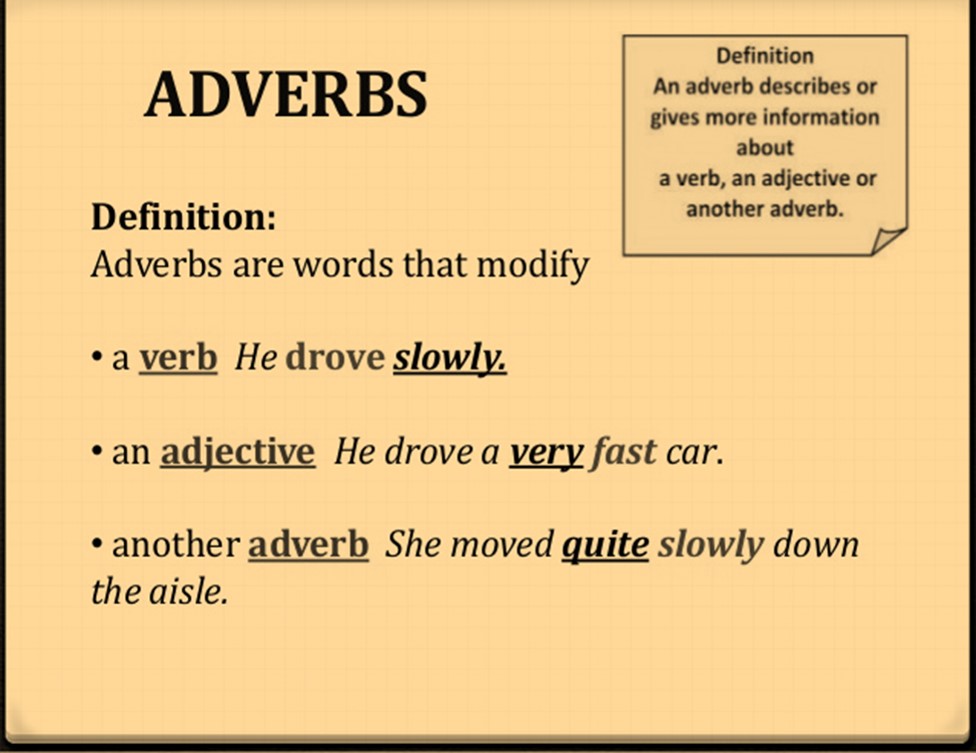
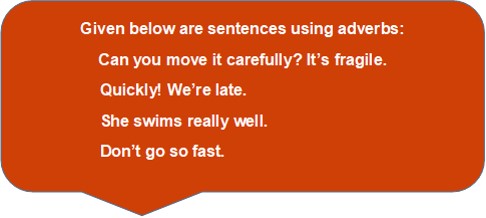
An adverb describes a verb, an adjective or another adverb. A verb is an action word (jump, run, swim, ski, fish, talk). An adjective is a descriptive word that describes a noun (pretty, happy, silly, sunny).
It is easy to see how adverbs describe verbs since they simply explain most about the action. For example:
Recap
Q.1 |
Identify the adverb in the following sentences. This April, it will have been a year since we came to this city. |
| a) | Came |
| b) | Since |
| c) | Been |
| d) | April |
Q.2 |
Identify the adverb in the following sentences. The lemonade my aunt prepared for me so sweetly tasted really delicious. |
| a) | Tasted |
| b) | Really |
| c) | Sweetly |
| d) | Delicious |
Q.3 |
Identify the adverb in the following sentences. It surprised my beyond belief how melodiously she sung at the school function yesterday. |
| a) | Surprised |
| b) | Yesterday |
| c) | Melodiously |
| d) | Function |
Q.4 |
Identify the adverb in the following sentences. When we were on a vacation abroad, for the first few days, we went nowhere and just basked under the sun, relaxing. |
| a) | Went |
| b) | Basked |
| c) | First |
| d) | Nowhere |
Q.5 |
Identify the adverb in the following sentences. It's been a ritual of mine to visit the temple every day. |
| a) | Temple |
| b) | Ritual |
| c) | Every |
| d) | Every day |
Q.6 |
Fill in the blanks using appropriate verbs in the future tense. My parents ___________ (visit) my aunt this weekend. (Future continuous) |
| a) | Will visit |
| b) | are visiting |
| c) | Will be visiting |
| d) | Will have been visiting |
Q.7 |
Fill in the blanks using appropriate verbs in the future tense. Looks like it ________ (rain) this evening. (Simple future) |
| a) | Will be raining |
| b) | Will have been raining |
| c) | Rained |
| d) | Will rain |
Q.8 |
Fill in the blanks using appropriate verbs in the future tense. By the end of this week, I ____________ (complete) my project work definitely. (Future perfect tense) |
| a) | Will complete |
| b) | Will have completed |
| c) | Will have been completed |
| d) | Will be completing |
Q.9 |
Fill in the blanks using appropriate verbs in the future tense. We already have Maths class this evening so we __________ (not attend) the dance lesson. (future continuous) |
| a) | Will not attend |
| b) | Will be attending |
| c) | Won't attend |
| d) | Will not be attending |
Q.10 |
Fill in the blanks using appropriate verbs in the future tense. Next year, I _______________ (practice) Kathak for over 10 years. (Future perfect continuous tense) |
| a) | Will have practiced |
| b) | Will practice |
| c) | Will be practicing |
| d) | Will have been practicing |
Your Score: 0/10
Yearlong program for Olympiads preparation & to build necessary skills for future.
Explore More
Time to mark your calendar with the upcoming Olympiads exam schedule.
Explore More
Take your Olympiad preparation to next-level by taking LIVE Classes.
Explore More
Assess your performance by taking topic-wise and full length mock tests.
Explore More
Online tuitions for international compeitions like SASMO, SEAMO, etc for Grades 1-11.
Explore More